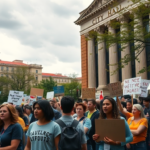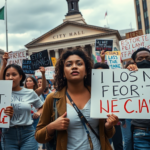Rising Mental Health Challenges Among LGBTQ+ Youth: A Community Call to Action
A recent study by The Trevor Project has unveiled a pressing concern – the escalating mental health challenges faced by LGBTQ+ youth nationwide, including a noticeable impact on local communities in the United States. According to the findings, over half of these young individuals experienced anxiety or depression between 2023 and 2025, shedding light on an urgent need for supportive measures and policies.
The Alarming Findings
Tracking the experiences of 1,700 LGBTQ+ youth, the study reveals a troubling rise in mental health issues. Reports of anxiety increased from 57% to 68%, and depression from 48% to 54% over the year. More alarmingly, suicidal thoughts among these youth ramped up from 41% to 47%, with transgender and nonbinary youth nearly twice as likely to face anxiety or suicidal thoughts compared to their cisgender counterparts.
Jaymes Black, CEO of The Trevor Project, emphasized the dire implications of these statistics, stating, “The increasing mental health struggles among LGBTQ+ youth are a direct reflection of the treatment they receive in society. We must take immediate action to protect and support these vulnerable communities.”
Conversion Therapy and Political Shifts
The study further highlights an unsettling increase in pressure to undergo “conversion therapy,” a harmful practice aimed at changing an individual’s sexual orientation or gender identity. Reports of such threats doubled, with 22% experiencing pressure, while exposure incidents rose from 9% to 15%.
Despite California’s historically supportive environment for LGBTQ+ rights, recent actions by local leaders underscore shifting political dynamics. Governor Gavin Newsom’s veto of a bill ensuring 12 months of hormone therapy coverage for transgender individuals, citing cost concerns, has sparked discussions about the state’s commitment to transgender health rights.
Furthermore, the U.S. Supreme Court is deliberating Chiles vs. Salazar, challenging Colorado’s ban on conversion therapy. The court’s conservative majority has expressed skepticism, potentially setting a precedent that could impact policies nationwide.
Dr. Ronita Nath, Vice President of Research at The Trevor Project, warns, “These developments are not just political but deeply personal for many young people. The persistence of conversion therapy highlights the urgent need for education and legislative action to prevent further mental health damage.”
Community Impact and Support Systems
Within local communities, the mental health struggles of LGBTQ+ youth resonate deeply. In areas like California, known for progressive stances, the recent veto by Governor Newsom suggests a need for re-evaluating political support and commitment to inclusive healthcare policies. For many residents, these developments are not just about legislation, but about the very fabric of community well-being.
Despite these challenges, there are hopeful signs of growing support networks. An increase in school support, from 53% to 58%, and a rise in peer support seeking, from 45% to 73%, offer promising avenues for communal healing. Local initiatives, such as peer mentoring and awareness programs in schools, play crucial roles in fostering safe, supportive environments for LGBTQ+ youth.
Jose Martinez, a local youth counselor, underscores the importance of community involvement. “Creating safe spaces at school and within the community can be lifesaving. It’s crucial for residents to actively support and engage with these efforts to show our youth they’re valued and not alone,” he says.
Access to Mental Health Resources: A Growing Concern
While the need for support is evident, the study also highlights a concerning decrease in access to mental health services among LGBTQ+ youth. Access dropped from 80% to 60%. However, among those who did receive counseling, 75% found it beneficial, rising from 61%.
The decrease in accessibility underscores an urgent need for policy interventions to expand mental health resources and ensure they are readily available and affordable. Organizations like The Trevor Project are advocating for policy changes and increased funding to expand these services.
Advancing Toward Inclusive Support
The findings from The Trevor Project mark a pivotal moment for communities to reflect and take action. As local leaders and residents navigate these challenges, it remains essential to prioritize inclusive and supportive measures for LGBTQ+ youth. Increased education, access to mental healthcare, and firm legislative actions against detrimental practices like conversion therapy are crucial steps forward.
In conclusion, this alarming trend in mental health challenges among LGBTQ+ youth requires an immediate response. Through collective efforts, including policy reform, community engagement, and unwavering support, residents can pave the way for a safer, more inclusive future for all youth. Woke News remains committed to shedding light on these critical issues, advocating for impactful changes that benefit the entire community.







